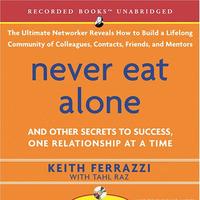6. CHAPTER 1 - Self-Help: A Misnomer
Self-Help: A Misnomer
How do you turn an aspiring contact into a friend?
How can you get other people to become emotionally invested in your advancement? Why are there some lucky schmos who always leave business conferences with months' worth of lunch dates and a dozen potential new associates, while others leave with only indigestion? Where are the places you go to meet the kind of people who could most impact your life? From my earliest days growing up in Latrobe, I found myself absorbing wisdom and advice from every source imaginable— friends, books, neighbors, teachers, family.
My thirst to reach out was almost unquenchable. But in business, I found nothing came close to the impact of mentors. At every stage in my career, I sought out the most successful people around me and asked for their help and guidance. I first learned the value of mentors from a local lawyer named George Love.
He and the town's stockbroker, Walt Saling, took me under their wings. I was riveted by their stories of professional life and their nuggets of street-smart wisdom. My ambitions were sown in the fertile soil of George and Walt's rambling business escapades, and ever since, I've been on the lookout for others who could teach or inspire me. Later in life, as I rubbed shoulders with business leaders, store owners, politicians, and movers and shakers of all stripes, I started to gain a sense of how our country's most successful people reach out to others, and how they invite those people's help in accomplishing their goals. I learned that real networking was about finding ways to make other people more successful.
It was about working hard to give more than you get. And I came to believe that there was a litany of toughminded principles that made this softhearted philosophy possible. These principles would ultimately help me achieve things I didn't think I was capable of.
They would lead me to opportunities otherwise hidden to a person of my upbringing, and they'd come to my aid when I failed, as we all do on occasion. That aid was never in more dire need than during my first job out of business school at Deloitte & Touche Consulting. By conventional standards, I was an awful entry-level consultant.
Put me in front of a spreadsheet and my eyes glaze over, which is what happened when I found myself on my first project, huddled in a cramped windowless room in the middle of suburbia, files stretching from floor to ceiling, poring over a sea of data with a few other first-year consultants. I tried; I really did. But I just couldn't. I was convinced boredom that bad was lethal. I was clearly well on my way to getting fired or quitting.
Luckily, I had already applied some of the very rules of networking that I was still in the process of learning.
In my spare time, when I wasn't painfully attempting to analyze some data-ridden worksheet, I reached out to ex-classmates, professors, old bosses, and anyone who might stand to benefit from a relationship with Deloitte. I spent my weekends giving speeches at small conferences around the country on a variety of subjects I had learned at Harvard mostly under the tutelage of Len Schlessinger (to whom I owe my speaking style today). All this in an attempt to drum up both business and buzz for my new company. I had mentors throughout the organization, including the CEO, Pat Loconto. Still, my first annual review was devastating.
I received low marks for not doing what I was asked to do with the gusto and focus that was expected of me.

